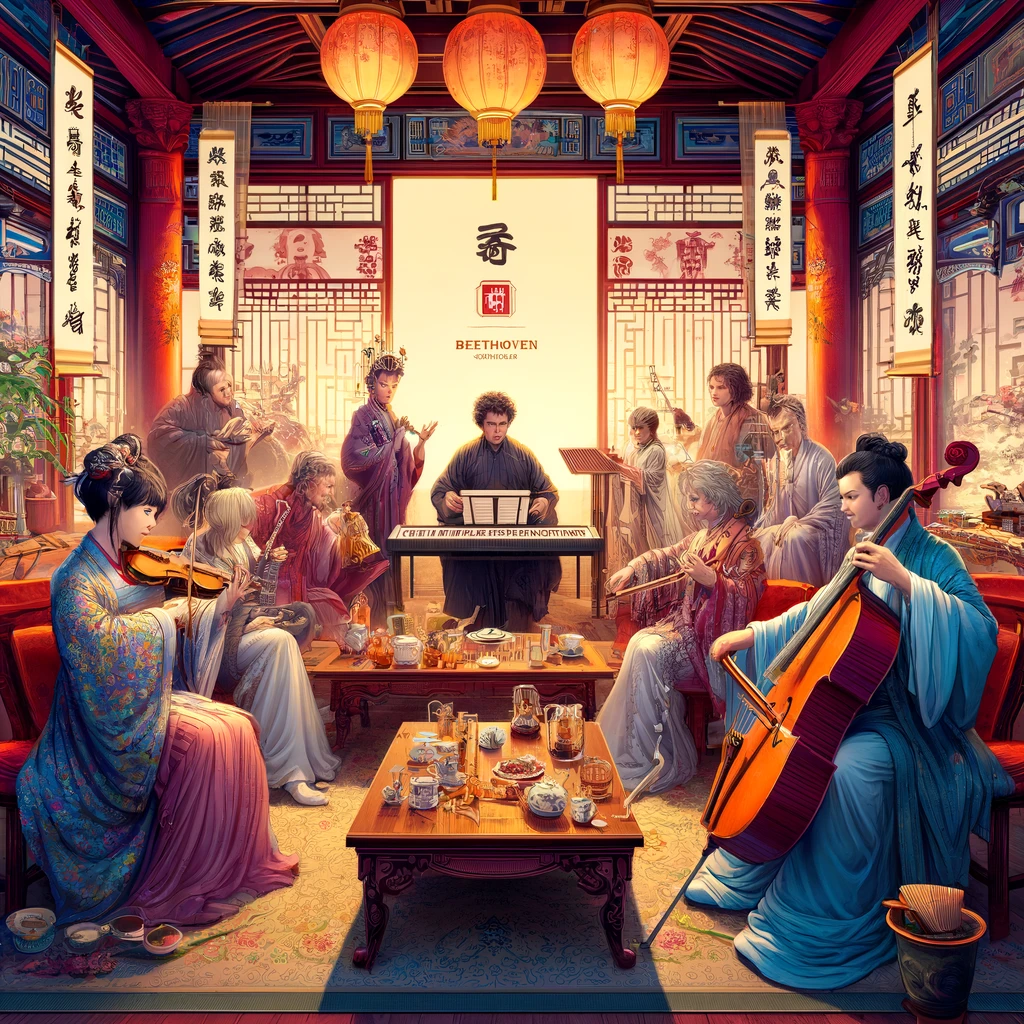
Beethoven in China: Bridging Cultural Divides
Ludwig van Beethoven, a towering figure in the history of Western classical music, has also played a significant role in cultural exchanges between the East and the West. His music, embodying universal themes of human struggle, triumph, and the search for beauty, resonates well beyond its Western origins. In China, Beethoven is not just a symbol of Western music but a beacon of artistic and personal freedom. This article explores how Beethoven’s legacy has influenced Chinese music and culture and how his works continue to foster cross-cultural dialogue.
The Introduction of Beethoven to China
The journey of Beethoven’s music into China began in the early 20th century, amidst significant social and cultural transformations. Western classical music entered China as part of a broader movement towards modernization. Musicians and scholars returning from studies abroad brought with them a raft of Western musical traditions, including those of Beethoven. His music, characterized by emotional depth and structural complexity, quickly gained a foothold among the Chinese intellectual elite.
During the tumultuous years of the mid-20th century, particularly through the Cultural Revolution, Western classical music faced severe restrictions and was often branded as bourgeois. However, Beethoven’s music, particularly his narrative of personal struggle against adversity—exemplified in his deafness and the triumphant nature of his compositions—resonated with the Chinese people.
Beethoven’s Influence on Chinese Musicians
Beethoven’s impact on Chinese musicians can be seen in two significant waves. The first was during the early adoption of Western music education, when figures like Xiao Youmei, a student of German composers, established one of the first conservatories in Shanghai in the 1920s. This institution was pivotal in training a generation of Chinese composers and musicians who were influenced by Beethoven’s methodologies and styles.
The second wave came after China’s Cultural Revolution. In the late 1970s and early 1980s, as China opened up to the world under the policies of reform and opening up, there was a resurgence of interest in Western classical music. Beethoven’s music, embodying themes of freedom and resistance against oppression, found a new audience among those yearning for cultural and personal liberation.
The Symbolic Role of Beethoven’s Music
Beethoven’s music played a symbolic role during several key moments in modern Chinese history. For instance, the Ninth Symphony, with its themes of freedom, joy, and brotherhood, has been performed at numerous important events to symbolize hope and unity. One of the most notable performances was during the return of Hong Kong to China in 1997, where the “Ode to Joy” segment of the Ninth Symphony was played to signify unity and a new beginning for the city.
Moreover, Beethoven’s birthday is celebrated across China with concerts and events, indicating the deep respect and admiration that Chinese people have for his work. These celebrations are not just about enjoying beautiful music but are a reflection of the shared values and aspirations that Beethoven’s music inspires.
Contemporary Relevance and Cultural Exchange
Today, Beethoven’s music is a vital part of the curriculum in Chinese music schools, and his compositions are standard repertoire for orchestras and solo performers alike. This widespread appreciation for Beethoven has fostered ongoing cultural exchanges, with numerous German and Chinese musicians working together to explore and perform Beethoven’s works.
Furthermore, modern Chinese composers have drawn inspiration from Beethoven’s innovation and emotional expression to develop a unique style that blends Eastern and Western traditions. This fusion has not only enriched China’s musical landscape but has also contributed to global classical music, offering new perspectives and sounds that might not have emerged otherwise.
Ludwig van Beethoven’s legacy in China is a testament to the universal appeal of his music and its power to transcend cultural and national boundaries. His compositions have not only introduced Chinese audiences to Western classical music but have also inspired a cultural dialogue that bridges East and West. As we continue to celebrate his influence, Beethoven remains a symbol of the enduring power of music to convey the deepest human emotions and ideals, regardless of the listener’s cultural background.
In the global context, Beethoven exemplifies how art can be a universal language—one that speaks to the shared experiences of humanity, fostering understanding and cooperation among diverse cultures. As his music continues to be played and cherished, it serves as a reminder of our common human heritage and the ongoing dialogue between the rich traditions of the East and the West.

Beethoven’s Music as a Tool for Educational and Social Change
The educational impact of Beethoven’s music in China extends beyond mere performance and appreciation. It serves as a critical tool in teaching not only music but also broader academic and social values. Schools across China use his compositions to teach students about the importance of resilience, creativity, and emotional expression. Beethoven’s life story, marked by perseverance in the face of his growing deafness, is particularly inspirational to young students, teaching them about overcoming personal challenges and hardships.
This educational approach aligns with the Confucian value of self-improvement and resilience, deeply ingrained in Chinese culture. Beethoven, therefore, is not just a foreign composer to be studied; he embodies qualities that are highly valued in Chinese society. His music and life story have become part of a larger narrative used in Chinese education to inspire students to strive for personal excellence and contribute to society.
The Role of Beethoven in Sino-European Cultural Relations
Beethoven’s music has also played a significant role in Sino-European cultural relations. For many years, European orchestras and conductors have toured China, bringing Beethoven’s works to life for Chinese audiences. These tours are not just musical performances but serve as cultural ambassadors, promoting mutual understanding and respect between Chinese and European peoples.
Conversely, Chinese musicians and orchestras have brought their interpretations of Beethoven’s music to Europe, showcasing their technical prowess and unique interpretative styles. These cross-cultural exchanges have enriched the classical music scenes in both regions, creating a vibrant dialogue that enhances each society’s appreciation for the other’s cultural achievements and historical contexts.
The Integration of Beethoven into Chinese Popular Culture
Interestingly, Beethoven’s influence extends beyond classical music circles into the broader realm of Chinese popular culture. His iconic image and music appear in various media, from television commercials to film scores, and even in literature and pop music. This phenomenon reflects the deep penetration of Beethoven’s art into the fabric of Chinese cultural life, signifying a fusion where Eastern and Western cultural elements meet and interact in creative and sometimes unexpected ways.
For instance, adaptations of his music in Chinese films often use Beethoven’s motifs to underscore themes of struggle and victory, much like they are used in Western cinema. This not only enhances the emotional impact of these films but also makes classical music more accessible to the general public, demystifying the genre for those who might not attend a symphony concert.
Future Perspectives
As we look to the future, the role of Beethoven in China is likely to evolve in exciting new directions. With the growth of digital media, more people than ever have access to his works, providing an opportunity for even greater engagement with Beethoven’s music. Additionally, collaborations between Chinese and international musicians around Beethoven’s repertoire are likely to increase, spurred by global digital platforms that facilitate cultural exchange and creativity.
Moreover, as China continues to assert itself as a global cultural powerhouse, its embrace of Beethoven can be seen as part of a broader strategy to engage with global cultural heritage while promoting its own cultural values and innovations. In this context, Beethoven’s music becomes a bridge not only between East and West but also between the past and the future, inspiring new generations of musicians and audiences around the world.
Conclusion
Ludwig van Beethoven’s music represents a cultural treasure that transcends geographical and temporal boundaries. In China, his legacy is a vibrant illustration of how Western art can integrate into Eastern contexts, enriching and being enriched in return. This ongoing cultural exchange highlights the power of music to unite individuals across diverse backgrounds, serving as a universal language of emotional and intellectual expression. As Beethoven’s music continues to inspire and resonate in China, it stands as a testament to the enduring power of art to bridge diverse cultures and spark dialogue and understanding on a global scale.